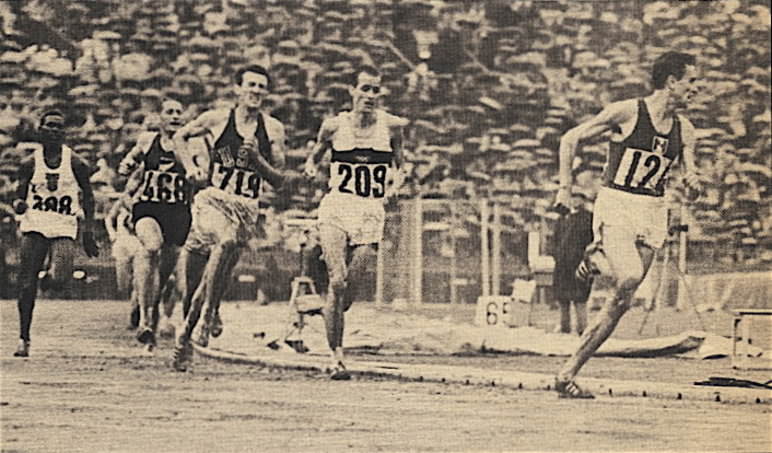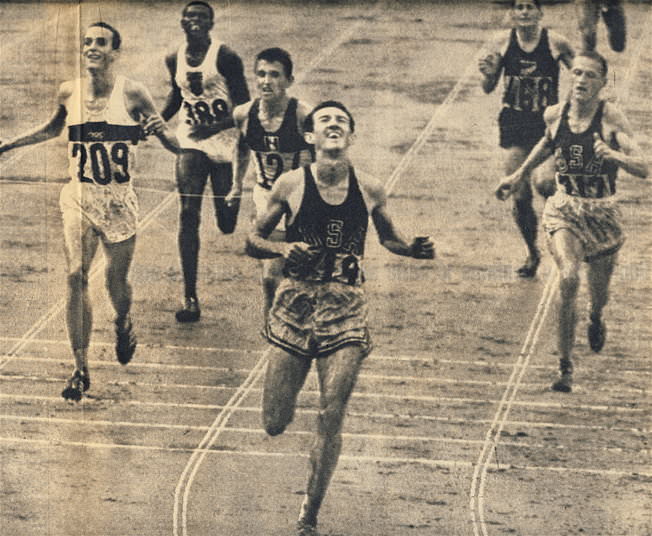Jazy v Norpoth v Schul v Dellinger
5,000 1964 OLYMPIC GAMES, TOKYO
Great Races #16
 |
| The last bend. Jazy leads Norpoth, Schul, Baillie and Keino |
Several runners lined up with realistic hopes of gold. Frenchman Michel Jazy, moving up from 1,500, hoped to improve on his silver medal in Rome. He clearly had the finish to win a slow race, but he had not proven himself in a fast race over this distance, his best being 13:50. Though not as fast a finisher, Ron Clarke of Australia was looking to make up for the disappointment over 10,000 four days earlier. With a three-mile time equivalent to about 13:39, he had to be considered a gold prospect.
Bob Schul (26) of the USA had beaten Clarke over 2 Miles indoors and had clocked a fast13:38 in Compton to defeat New Zealander Bill Baillie, another medal contender in this race. He also had two four-minute miles under his belt and a 2 Miles WR of 8:26.4. Schul had won the US trials comfortably from Bill Dellinger (29); Dellinger had decided not to peak for these trials—a risk, he said (See Kenny Moore, Bowerman, p.174), but he wanted to peak in Tokyo. Also in the field was Briton Mike Wiggs, who had impressed after running at a US university. Harald Norpoth (22) of Germany, with a 13:48.4 PB, was yet another medal prospect. He had made the European 1,500 final in 1962 and was with the leaders when he fell with a lap to go.
The race began in steady rain; the temperature was 10.5C. The sodden cinder track at least had no puddles. The first two laps were slow, 68.8 and 69.7. Then Clarke took over as expected, passing 1,000 in 2:50.2. On the fourth lap Mike Wiggs, in 8th place, fell after clipping an opponent’s foot. A surging Clarke continued to lead with laps of 64.7, 67.2 and 68.5, to pass 2,000 in 5: 39.4. Next Clarke made his strongest surge, spreading out the field considerably. His sixth lap was 62.5. His pace variation was having little effect on his main opponents. So he eased up with a 70.6 lap and allowed the field to regain contact. He surged again with a 65.7 lap, passing 3,000 in 8:22.2. Jazy was right on his shoulder and Norpoth and Baillie close behind. Schul and Dellinger, who had run at a more even pace moved up with the leaders as Clarke slowed with a 69.3 lap. The Aussie tried to surge again, but with little authority, and Jazy surprisingly and perhaps unwillingly took over the lead. A 67.9 lap. The lead group still had nine runners with 600 to go. A surprise runner in this group was a young Kip Keino of Kenya, whose best time was equivalent to only 14:15.
 |
| 250 to go. Jazy leads Norpoth and Schul. Dutov is being passed by Dellinger (hidden) and Baillie. Keino lies 7th. |
At this point Dellinger rushed from the back of the pack to take the lead. He headed the field as they passed the bell in 12:54. Jazy, Norpoth, Clarke, Baillie and Keino were all in contention. On the curve Jazy took the lead and accelerated off the bend. He quickly opened a 6-meter gap. It was a dramatic attack, but could he maintain this lead? The most determined efforts to catch him came from Norpoth and Bob Schul, the latter initially slow to react, having been boxed in by the Russian Dutov. Along the back straight Norpoth and Schul moved a little ahead of the pack but didn’t gain on Jazy. Norpoth was within 4 meters of Jazy with 200 to go, and Schul was on his shoulder.
Around the final bend Schul passed the German and closed to within three meters of Jazy. “When I came off the bend,” Schul later recalled, “I wasn’t that far behind him. His shoulders had tightened, and he looked back a few times. I thought to myself, ‘I’ll be able to catch him—no problem.’” (Interview, graycohenrunning.com, November 2010) Schul passed the Frenchman with just over 60 meters to go and had a clear margin at the tape. Behind him Norpoth also passed Jazy with 40 to go, and then Dellinger just caught the faltering Jazy on the line to earn the bronze medal. Schul had run the last 300 in 38.7 and his last lap in 54.8. Norpoth and Dellinger ran 55.8 and 56.0 respectively. Behind the top four, Keino outsprinted Baillie for fifth spot. Only 2.2 seconds separated the first six.
 |
| Bob Schul hits the tape while (left to right) Norpoth, Jazy and Dellinger fight for silver and bronze. Keino (389) and Baillie finish 5th and 6th. |
Post Mortem: Schul ran a wonderful race, but he was lucky that Clarke didn’t make a more definitive break with his surging . Several times he chose not to react to Clarke’s surges and temporarily lost contact with the leading group. However, he did benefit from this risky tactic, as he didn’t expend as much energy on the surges as his competitors did. Jazy, with the pressure of a whole nation on his shoulders, expended too much energy in the first eleven laps, always going with the surges and always jostling for a good position near the front. Further, he made his run for the tape too early. Had he waited until the last 200, he might well have won the race.
Clarke’s inexperience at world level, despite his 10,000 WR, was evident in his inability to control the race from the front. Norpoth ran brilliantly, but it is hard to imagine a scenario in which he would have won the race. Dellinger, who was actually the fastest in the last 100, misjudged his race: he could have been second. In short this race was a triumph for American distance running. The influence of an imported coach, Hungarian Mihaly Igloi, who had advised Schul, and of a homegrown coach, Bill Bowerman, who coached Dellinger, was an essential ingredient of this triumph. Cordner Nelson of Track and Field News summed up this race succinctly: “The total pace was slow but it contained so many surges that it wore out the runner with the most endurance as well as the one with the most speed.” (October/November, 1964, p. 12)
1. Bob Schul USA 13:48.8; 2. Harald Norpoth GER 13:49.6; 3. Bill Dellinger USA 13:49.8; 4. Michel Jazy FRA 13:49.8; 5. Kip Keino KEN 13:50.4; 6. Bill Baillie NZL 13:51.0.
Leave a Comment